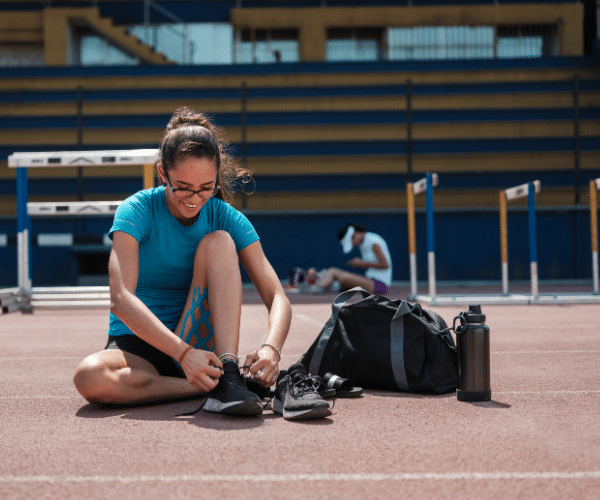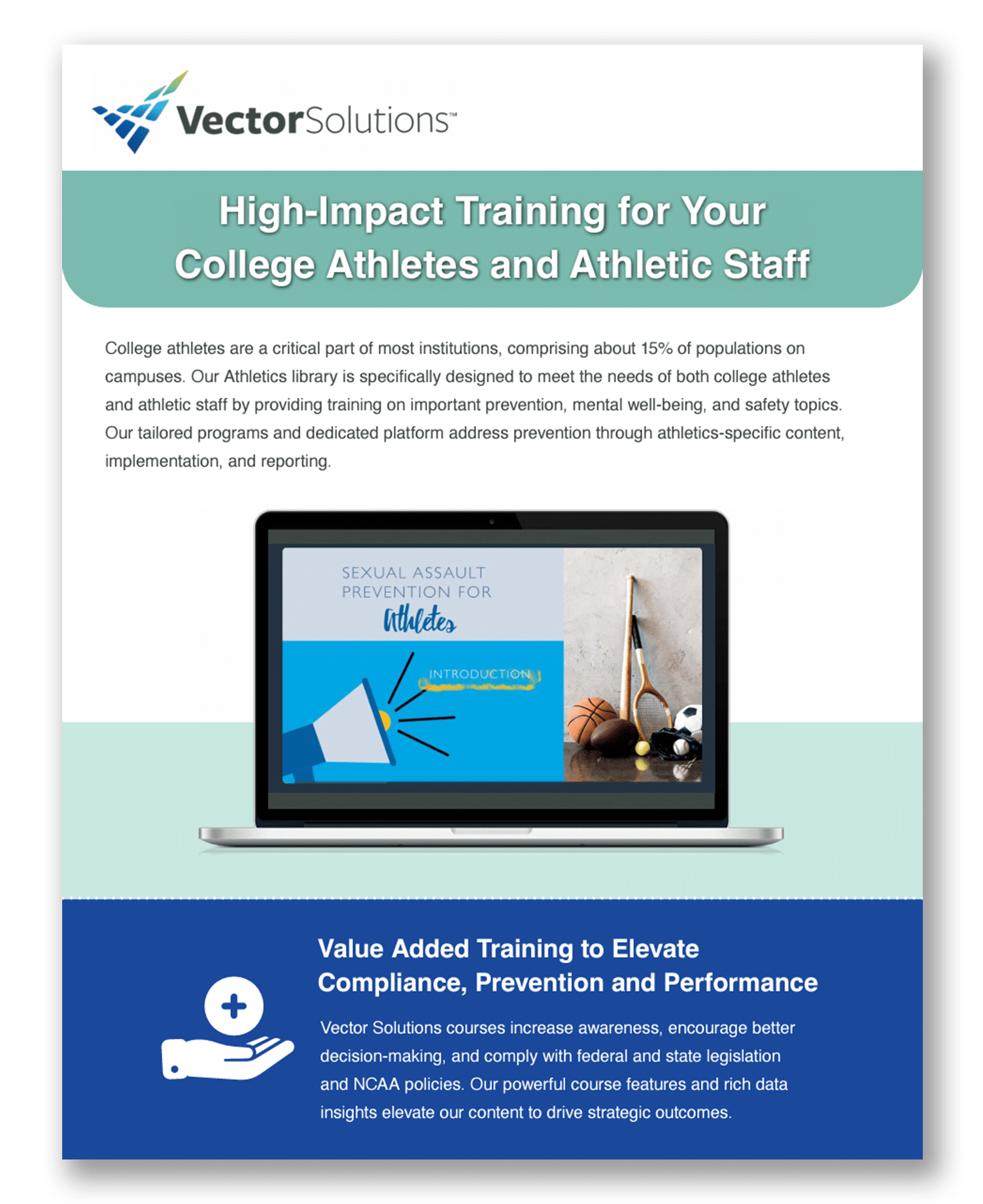October 3, 2023 min read

Sexual Assault Prevention Education: What Your Campus Athletics Program Needs to Know
Industry:
Solution:

Despite many years of efforts by colleges and universities to address sexual and gender-based violence, sexual misconduct is still a significant concern on college campuses, particularly when it comes to college athletes. A 2021 survey found more than one in four college athletes reported being sexually assaulted or harassed by someone in a position of power on campus, compared with 1 in 10 of those in the general student population. In addition, there have been several high-profile reports of sexual assaults perpetrated by college athletes against other students, as well as athletic staff tolerating, encouraging, or even committing sexual harassment, assault, or other forms of gender-based violence.
In 2017, the National Collegiate Athletic Association (NCAA) Board of Governors passed a Policy on Campus Sexual Violence to help reduce and prevent sexual misconduct involving college athletes. Among the requirements are that all athletes, coaches, and staff receive education on sexual violence prevention, intervention, and response each year.
It’s the job of university chancellors or presidents, directors of athletics, and campus Title IX officers to ensure that the NCAA policy is being followed. So, what exactly does a good sexual assault prevention plan look like?
The NCAA provides “checklists” to consider when developing a sexual assault prevention plan to meet the NCAA Policy on Campus Sexual Violence. Below is its checklist specifically related to the education requirement – along with specific topics (in bold) that should be covered in training courses. These checklists, developed by researchers and campus prevention experts, are applicable to any athletic program looking to strengthen their comprehensive health promotion efforts.
Sexual Assault Prevention Education Checklist:
1) Timely implementation of educational programming at or around relevant campus and athletics events such as orientation activities, team meetings, before significant competitive events, before breaks, during national awareness months, and during times that mark significant campus history/events or other higher-vulnerability periods.
2) Ongoing education for athletes and all relevant athletics department stakeholders focused on the definition and nature of sexual violence, the importance of positive, consensual behavior and other similar topics.
3) Ongoing education for athletes and all relevant athletics department stakeholders regarding misogynistic, homophobic, demeaning, marginalizing and hostile language; how negative language choices adversely impact team cultures; and how positive language choices can contribute to respectful and healthy environments.
4) Ongoing evidence-informed education for athletes related to substance misuse and the relationship between sexual violence and alcohol and other drugs.
5) Skill development training for athletes on topics such as respectful communication in healthy relationships, bystander intervention, negotiating consent, giving consent, respecting non-consent, active listening and managing a referral process.
6) Regular and periodic evaluation of the effectiveness and impact of educational programming and activities.
7) Regular and age/topic appropriate training and education for all individuals responsible for staffing camps, clinics, campus visits of prospective student athletes and other events or activities sponsored by athletics. Training should be focused on legal, institutional and athletic associationrequirements and expectations related to conduct relative to preventing, responding to and reporting incidents of sexual violence. Also consider whether chaperones may be appropriate in these situations.
8) Use of equity-focused language that conveys respect for diversity in all athletics department educational messages, materials and programming.
Considering training programs that have been vetted to ensure compliance with federal, state and/or athletic association requirements and that are also relevant, engaging, and convenient will help college athletic programs meet the letter of the law and also increase athlete safety and well-being. Online courses can be a good option because the format makes it easy for students and staff members to complete the courses at times that fit into their schedules.
How Vector Solutions Can Help
Vector Solutions offers expert-authored online courses for college and university staff and students, specifically designed to address the NCAA Campus Sexual Violence Policy.
Courses include:
- Sexual Assault Prevention for Athletes
- Sexual Violence Prevention Essentials for Athletes
- Sexual Assault Prevention for Athletic Staff
- Sexual Assault Prevention for Athletes Ongoing – This brand new course provides an additional training option that can be assigned in alternate years.
View the full Athletics course library.
High-Impact Training for Your College Athletes and Athletic Staff
Vector Solutions’ Athletics library is specifically designed to meet the needs of both college athletes and athletic staff by providing training on important prevention, mental well-being, and safety topics.
Download Brochure
Vector Solutions also provides training courses on mental well-being, alcohol and substance misuse prevention, diversity and inclusion, and more.
The courses also provide data insights and administrative tools to help improve the impact of prevention education. Highlights include:
- Surveys offered immediately before and after each course to evaluate learner attitudes, beliefs, behaviors and experiences.
- Follow-up surveys 30 days after course completion to measure long-term impact.
- An Impact Report with data, insights, benchmarking and recommendations based on the institution’s use of the program.
- Tools to manage and track course completions.
- Customization so institutions can add their policies and resources directly in the course to deliver and track alongside the training content. This is important because the NCAA policy also requires that the institutional policies/procedures are distributed to athletes, athletic staff, and coaches.
A Comprehensive Solution
Colleges and universities strive to make campuses safe and welcoming places where students can learn and grow their interests and talents, including through participation in sports. Having sexual assault prevention programs in place that are specific for athletes, coaches, and other athletic program staff members, can go a long way toward creating these safe environments. Education is just one component of this. A well-rounded, comprehensive prevention program should also include communication, collaboration among departments and with community organizations, and resources and support for students. This will help ensure compliance with NCAA policy and other training mandates and it will help support the broader goal of creating a safe campus for all.








